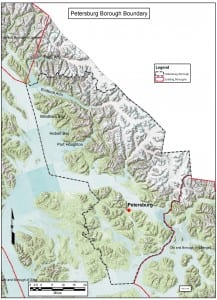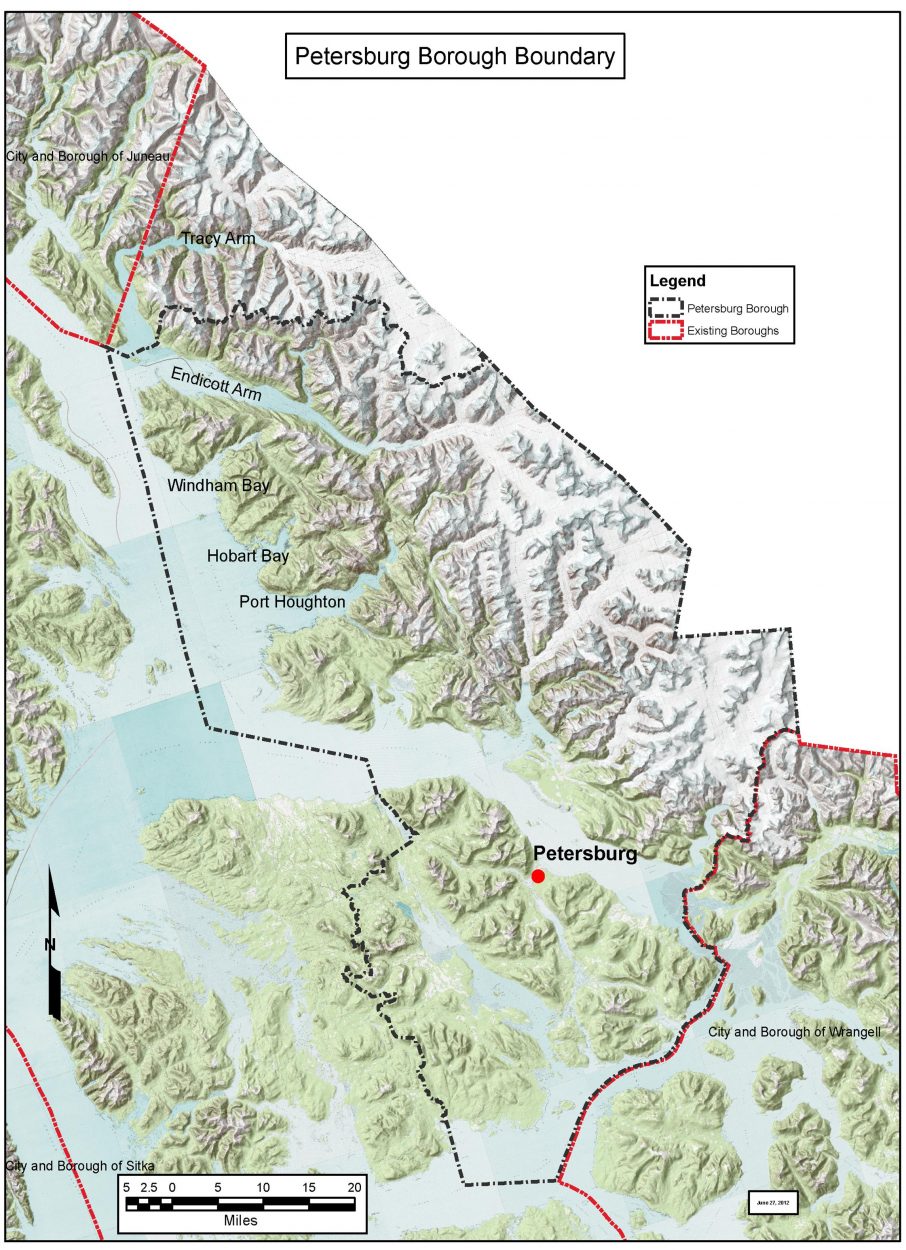With planning and taxation responsibilities over a much larger portion of central southeast Alaska, Petersburg’s newly formed Borough government has more work ahead. Within the next year, the borough will be assessing the value of newly incorporated property. Officials will start work on a new, borough-wide comprehensive plan. And, the Assembly will begin to consider which 17 hundred acres of state land should become property of the borough.Those are just a few of the big tasks ahead for the newly expanded municipality.

Shortly after the initial results were announced last month, Matt Lichtenstein asked several borough supporters and opponents for their thoughts about moving forward:
Click here for mobile-friendly audio
Last month’s mail-in borough election drew one of the highest turnouts on record. Nearly 58 percent of area voters cast ballots. Over 55 percent said yes and just under 44 percent said no. Former City Councilor and now….newly-elected Assembly Member Sue Flint was a yes vote…but she was mindful of the fact that there were plenty of people who felt otherwise.
“I’m pleased that it passed. It does show we are divided at this point on this issue and that’s our main goal, I think, going forward is to unite and to plan how to proceed together,” siad Flint last month.
One of the borough’s first orders of business will be to fill vacant assembly seats and other elected posts that had no candidates. This is typically done by appointment in a borough or city but the process is now more cumbersome for potential office-holders. City of Petersburg voters long-ago chose to exempt local candidates from the state’s financial disclosure requirements. However, the Alaska Public Offices Commission says that exemption no longer applies for a new borough which is a change in municipal status. So, candidates and appointees have to file the lengthy forms with the state, at least until borough voters decide otherwise in a future election. That’s one of Flint’s priorities.
“…to put to the voters to get rid of the APOC requirement for people running for local office to encourage more participation for everyone because that’s kind of a stumbling block for people,” she said.
And there are a bunch of vacant seats to fill, including two on the assembly and three on the hospital board. There are also three unfilled spots on the school board and all seven seats are open on the planning commission.
Appointees normally fill vacant seats until the next regular election but new Borough resident Bob Lynn of Duncan Canal thinks there should be a special election sooner than that. He’d also like to see voters consider a balanced budget requirement for the borough as well as other potential changes to the way the municipality does business.
“I think it’s time to look all the boards and commissions that (are) here. I’m not sure that all those things are needed and I think that would be an excellent thing to put on a special ballot too,” Lynn said.
Among other things, Lynn would also like to see the borough address what some residents see as inequities in the property tax levy on various parts of town. Lynn suggested putting together a group of area residents from inside and outside the former city limits to come up with items for a special election ballot.
Lynn served on the original borough charter commission but opposed the final borough plan that the city submitted to the state and, ultimately, the voters. Despite his disappointment that it appeared very likely to pass last month, Lynn was looking ahead.
“I really do feel that its time, as I say, to put it past and look into the future and I think there is just an absolute golden opportunity to make changes at this point which probably won’t be able to be done again and I would hope that those folks that are on the assembly and in a leadership position there would be willing to take some of those on and to make some change,” he said.
One change Lynn would like to see soon is assembly meetings in the daytime. That’s considering the difficulty and expense some outlying residents face in getting to town. For instance, Duncan Canal is about a 20 mile boat ride through the Wrangell Narrows to Petersburg.
Former city councilor and newly-elected assembly member John Hoag encouraged residents in newly-incorporated areas to consider serving in a borough office and said he would want local government to do whatever it could to maximize everyone’s chance to participate.
Like his fellow assembly members, Hoag is a borough supporter. And like Flint, he also noted that the vote was reasonably close. He said that simply meant that borough officials were on probation to prove that they’ll do a good job.
“You know my goal as to the borough is to go forward and show the community that the promises that were made are going to be kept and the areas that are outside the existing limits are not going to be taxed to death,” Hoag said.
If residents outside the former city limits want more services and are willing to pay for them, Hoag thinks the Borough government should work on providing them. Also, Hoag does not want to extend former city ordinances or rules outside the former city limits without getting full input from residents in those areas.
“What do they want or not want. Do they want absolutely no zoning regulations at all. And if that’s what the overwhelming majority wants well so be it but then don’t petition us when the rendering plant shows up next door,” he added.
Hoag says the borough also needs to exercise fiscal prudence. While he said the tax-supported general fund was on a good footing, he was concerned about the enterprise funds. Those funds, like the water utility, for instance, are paid for by customers who use their services and Hoag was concerned they needed to build adequate reserves to eventually replace aging infrastructure.
Concerns over taxes, spending and fiscal responsibility were prominent for borough opponents. Among them was George Cole of Keene Channel, which is down the Narrows by Duncan Canal.
“And I wouldn’t be a bit surprised if there aren’t some demands made by the the citizens that live in the outlying areas to be considered as borough residents so that taxes that are collected on a borough-wide basis are expended on a borough-wide basis and that money that comes in from the state for the borough that they get their fair share of whatever those moneys are,” Cole said.
Cole has long been an active borough opponent and serves as the the ad-hoc treasurer of CCUB. That’s Concerned Citizens of the Unorganized Borough, a group of area residents who organized a prominent campaign against incorporation with an extensive website, letters to the editor, radio commentaries, yard signs and even satirical cartoons. The City of Petersburg organized borough supporters who put out signs and editorials to promote the effort. The debate was intense and, at times, got personal.
Cole said he was saddened by election outcome. At the same time he was hopeful the community could do some healing as far what he called the emotional divisiveness that has been apparent over the past couple of years. Moving forward, Cole suggested several ideas for borough leaders to consider.
“I think that any ordinance that’s not organic in nature should have a sunset law. There should be a sunset attached to it so that laws just don’t go in perpetuity….that there is some reconsideration given after an appropriate amount of time…seven, ten years, whatever. I think that there should be consideration given that anybody who exists at or below the federal poverty line should not be endanger of losing their residence or their property. They should be exempt from having to pay property tax,” he suggested.
Senior citizens in Alaska currently get an exemption for property tax on the first 150 thousand dollars in assessed value of their primary residence but the benefit is not based on income. As far as sales tax, Cole thinks everyone should probably have to pay it, whether or not they are seniors who currently enjoy an exemption in Petersburg.
Taxation is just one of many issues the new borough Assembly will wrestle with in the coming years. It convenes for the first time on January 7th.
(This story has been modified from its original version to correct the voter turnout percentage, which was over 53 percent, not 58 percent as originally stated. KFSK regrets the error)










